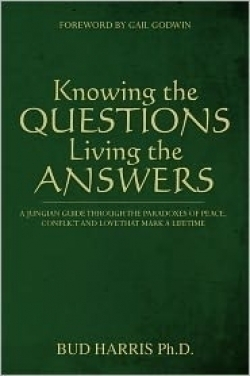
Knowing the Questions, Living the Answers
We live in an era of pop psychology, where self-help books offer five easy steps to fixing your life, and television personalities like Dr. Phil solve marital problems in fifteen minute segments. It is refreshing to encounter work that challenges us to forego instant gratification, and instead take a long view of the work we each need to do to understand ourselves and our problems. Dr. Bud Harris, a Jungian analyst with several decades of clinical therapeutic experience, examines these essential topics in a thoughtful presentation of the psychological challenges we face over a life span.
The ideas are complex, and the tone of the work is sober and scholarly. Fortunately, Harris writes beautifully, with supple, lucid prose. He elucidates how reflection and insight into the root causes of our behavior and attitudes can help us take “psychological responsibility for our previous unconscious actions,” and ultimately “weave the experiences of our life and our fate…into the patterns of our destiny and begin to comprehend what life wants of us.” He hastens to add that this effort has minimal support and value in “a society focused on extroversion, identity, and productivity.” But he effectively argues the case for such soul-searching, and suggests that the effort is rewarded in a far richer, happier life.
Using Carl Jung’s seminal concepts, Harris describes the developmental stages of our lives, including struggles with identity as we move into adulthood, midlife conflicts, and late-life efforts towards emotional maturity. He uses his own conversations with therapy clients to illustrate how some of these issues can play out, and details how clients’ dreams can be remarkably useful in illuminating unconscious messages. In one example, he recounts the story of a woman who had started over in midlife with a new career and a new relationship, feeling herself to be a different person. A dream repeating several times, however, found her in her old home with her former husband, who “looked at her and smirked knowingly.” Therapist and client worked together to see that the dream was pointing out her denial of her past life and former self, and that the task of integrating the old with the new still remained.
Rather than breaking any new ground, the author provides a synthesis of ideas in the field, drawing from and appropriately acknowledging the work of Jung, Sam Keen, Joseph Campbell, Marie-Louise von Franz, and others. But while there is nothing particularly innovative here, the work is nonetheless impressive as a gracefully written, clearly presented guide to a complex school of thought.
Reviewed by
Laurie Sullivan
Disclosure: This article is not an endorsement, but a review. The publisher of this book provided free copies of the book and paid a small fee to have their book reviewed by a professional reviewer. Foreword Reviews and Clarion Reviews make no guarantee that the publisher will receive a positive review. Foreword Magazine, Inc. is disclosing this in accordance with the Federal Trade Commission’s 16 CFR, Part 255.
